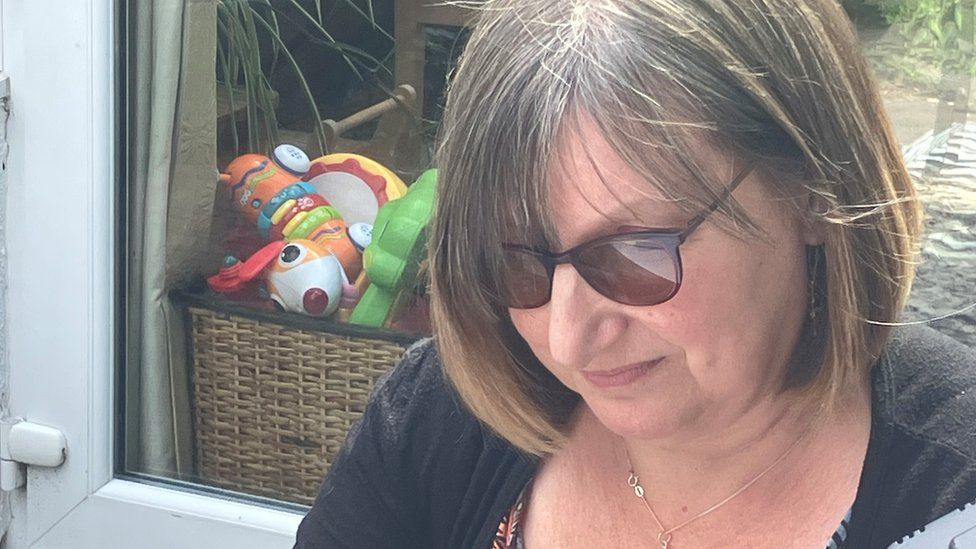Leicestershire woman who lost eye calls for contact lens warnings
- Published

A woman who lost an eye is calling for better warnings on contact lens packs over the risks of contamination.
Marie Mason developed an infection in her left eye after an amoeba got between her contact lens and cornea.
Her vision deteriorated and, after a series of unsuccessful operations, her eye had to be removed.
She believes the organism got into her eye through water and now wants the contact lens industry to do more to make users aware of the hazard.
Ms Mason from Sapcote in Leicestershire, said she began to feel discomfort in her eye in 2015.
She said: "I started feeling like I had a foreign body in my eye like a bit of sand or grit which, when you rub, it will normally go away, but it wouldn't."
Experts identified the problem as Acanthamoeba keratitis, which can be found in tap water.
She added: "It lives in water and soil and it is so tiny it managed to get between my contact lens and cornea and started feasting on my cornea.
"It would have got under the lens then multiplied, so my eye was riddled with it."
The 54-year-old underwent three cornea transplants to try to repair the damage it caused but the procedures failed.
Her eye was removed in March 2020 and she now wears a false replacement.
Ms Mason is now calling for the risk to be prominently shown on contact lens packaging to warn people not to wear lenses in the shower or touch them after washing their hands.
She said: "If you want to wear contact lenses, that is fine, but just be very careful how you handle them.
"Water is the man thing you have to be wary of.
"Make sure you don't get any water near your eye, and make sure you wash you hands and dry them thoroughly before you touch your contact lenses."
Her calls are being backed by an expert, Professor John Dart, who called on companies to make the importance of good hygiene clear.
Prof Dart, honorary professor at University College London at the Institute at Ophthalmology, said the amoeba can live on corneal cells and can cause a long-lasting, difficult-to-treat infection.
He said: "We only have about 150 to 200 cases in the UK every year. Very few people actually lose the eyes but about half of those cases will lose a substantial amount of vision.
"The amoeba has been shown to have pretty devastating effects on the cornea."
He said he wanted to see warnings on packaging.
He said: "These are very simple things to put on the back of a box. It's not rocket science."
Luke Stevens-Burt, chief executive officer of the British Contact Lens Association (BCLA) said cases like Ms Mason's were rare but it was critical eye care professionals advised lens users of the risks of contamination and safe practice.
He said limited amounts of space was an issue on packaging and that messaging could be confusing.
He added: "We would be supportive of reviewing and looking at all ways of improving the safety information on contact lens packaging.
"However we understand some of the limitations on space and the regulatory restrictions and requirements."
He said packaging was often discarded as soon as the lenses were removed but that the BCLA already provided "no water" stickers for contact lens cases as a daily reminder to users.
Follow BBC East Midlands on Facebook, Twitter, or Instagram. Send your story ideas to eastmidsnews@bbc.co.uk.
Related Topics
- Published20 May 2022
- Published16 January 2020